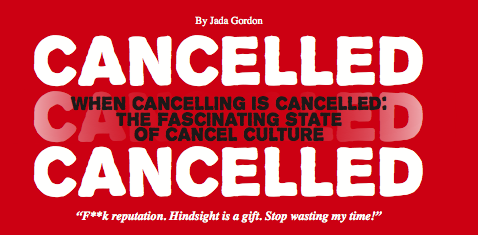OPINION: When Cancelling is Cancelled: The Fascinating State of Cancel Culture
The following opinion piece was featured in the March 2020 edition of The Campus.
By Jada Gordon
“F**k reputation. Hindsight is a gift. Stop wasting my time!”
protested Hannah Gadsby in her 2018 Netflix comedy special, Nanette. In this evocative live performance, Gadsby dives into the details and inner workings of our culture's obsession with men and their legacies. This idolization is often despite nefarious and insidious words or actions, and with no statute of limitations -- they could be from 3 weeks or 30 years ago. In the past decade, we have observed the most prominent of cultural figures and institutions be challenged, tested, and, in the most extreme cases, completely and utterly destroyed. In return, left with the exposed remnants of what was dismantled, we have had to reexamine their place in our lives and experiences, again both past and present. It is a painful, yet necessary task to hold a mirror up to the figures who have influenced our lives and our culture; however, Pandora’s box has long been open, and we cannot un-see what we have found.
“Cancel culture” is an internet theory taken where an individual does or says something offensive or insensitive to other people. In return, the individual is criticized and considered “canceled.” It is a signifier of the technological age that we live in: we now see fans and critics alike as, somehow, closely and intimately connected with famous people situated hundreds of miles away, in both geographical distance and social class. Celebrity icons who were once seen as inaccessible before social media, we now see daily and make them more a part of our everyday lives than ever before. Of course, with this proximity comes a fair share of danger and consequences as we are granted an up close and personal examination of celebrities’ every move, word, and deed. While many have, or inevitably one day will, endure their fair share of criticism on social media, being canceled, for a public figure, is to have their legacy wrapped in a tight and unforgiving knot of controversy and pain. Bill Cosby, for example, is a casualty of cancel culture. His history of drugging and sexually assaulting women, while simultaneously being “America’s Dad” has exposed him as an abuser, rapist, and overall liar, thus leaving him canceled. Other notable casualties of cancel culture include R. Kelly, Roseanne Barr, and Woody Allen.
While these members of cancel culture are seemingly obvious and clear cut, many cancelations have sparked a more nuanced and controversial debate. Cancel culture has, at times, become so restrictive towards the dissenting opinion that it is increasingly partisan, biased, and political, overtaken by groupthink ideology.
Subjectively polarizing artists like Kanye West and Taylor Swift, both of whom have made public statements regarding each other, is a paired example of two celebrities who have been subjected to cancel culture yet remain surprisingly unscathed. Kanye West’s support of President Trump was divisive and the artist lost fans just about as quickly as he gained them. Despite this moment in time, West’s voice, music, and public image are far from diminished. In a similar situation, Taylor Swift’s public persona and various missteps are scrutinized often, yet she is still highly influential.
Are we seeing a case of picking and choosing artists to cancel? Are people not allowed to have different opinions and beliefs without being attacked?
The dividing line between mortality and survival of cancel culture is razor-thin. Despite this fact, there is a seemingly endless sea of gray area that leaves those caught in cancel culture in a wide net of confusion. Any one person, at any given time, can be seen straddling the sides of completely canceled, problematic, unproblematic, and all degrees in between. As humans, we tend to be layered and full of nuance. However, there is a method to the madness and reasons for why we believe in what we do. Cancel culture cannot be the scale on which one measures another’s humanity, both tied in a destiny knot that cannot be undone. Just because there is cognitive dissonance, does not mean a voice should be silenced. Voices are to be discussed and challenged, not attacked and shut out.
Unforgivable offenses, such as sexual assault, racism, homophobia, transphobia, etc., are grounds for canceling, however, if a person wants to unlearn those habits, they should be allowed to do so. People can always grow from their mistakes; it is when they do not learn from their experiences that canceling should commence. When people learn from, instead of attack, each other, growing can, likewise, commence. Change is possible and it is a choice whether a person wants to unlearn toxic habits or not.
Cancel culture strenuously exercises subjective personal limits and walks the line of public opinion and acceptability. A balance must be restored when participating in cancel culture because it is this balance that provides the necessary degree of nuance. So now, with cancel culture receiving backlash from social media, the tides may be turning, allowing healthier dialogue to occur, increasing accountability, and promoting the harder task of actually learning from public other’s missteps in our personal lives, rather than passively canceling them and proceeding having learned nothing.





